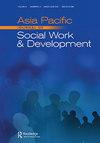2019冠状病毒病大流行期间在日本社会福利体系内不稳定地工作:非正规一线工人的无抵抗韧性
IF 1
4区 社会学
Q3 SOCIAL WORK
Asia Pacific Journal of Social Work and Development
Pub Date : 2022-07-03
DOI:10.1080/02185385.2022.2134194
引用次数: 1
摘要
COVID-19全球大流行暴露了新自由主义长期存在的结构性不平等。必要的工作人员,包括帮助专业人士,经历了高水平的压力。这项试点研究审查了大流行期间日本社会福利工作者面临的挑战。日本市政府的社会福利部门是公共援助和社会服务的主要提供者,其工作人员由政府官员(GOs,长期政府雇员)和非正式前线工作人员(NRs,按年度合同雇用,主要是女性,负责直接个案工作)组成。在叙述调查的基础上,对政府官员和非政府组织成员进行了五次单独访谈。专题分析强调了nr中就业不稳定、个性化和无力感的增加。注册护士表示,安全风险、工作时间长和组织支持不足加剧了他们的压力。按不同类型的合同、相应的任务和性别分层,注册护士经历了加剧的孤立,导致倦怠。讨论了在新自由主义社会福利制度下,在流行病中不稳定工作的影响。本文章由计算机程序翻译,如有差异,请以英文原文为准。
Working precariously within the social welfare system in Japan during the COVID-19 pandemic: Resilience without resistance among non-regular frontline workers
ABSTRACT The global COVID-19 pandemic exposed structural inequality perpetuated by neoliberalism. essential workers, including helping professionals, have experienced a high-stress level. This pilot study examined the challenges faced by social welfare workers in Japan during the pandemic. Japanese social welfare departments in municipal governments, which are primary providers of public assistance and social services, are staffed by government officers (GOs, permanent government employees) and non-regular frontline workers (NRs, hired on annual contracts, predominantly female, covering direct casework). Informed by narrative inquiries, five individual interviews of GOs and NRs were conducted. The thematic analysis highlighted the increased employment instability, individualisation, and powerlessness among NRs. NRs expressed intensified stress from the safety risk, long working hours, and insufficient organisational support. Stratified by different types of contracts, resultant tasks, and genders, NRs experienced intensified isolation, leading to burnout. The implications of working precariously in the pandemic under the neoliberal social welfare systems are discussed.
求助全文
通过发布文献求助,成功后即可免费获取论文全文。
去求助
来源期刊

Asia Pacific Journal of Social Work and Development
SOCIAL WORK-
CiteScore
4.10
自引率
5.00%
发文量
21
 求助内容:
求助内容: 应助结果提醒方式:
应助结果提醒方式:


